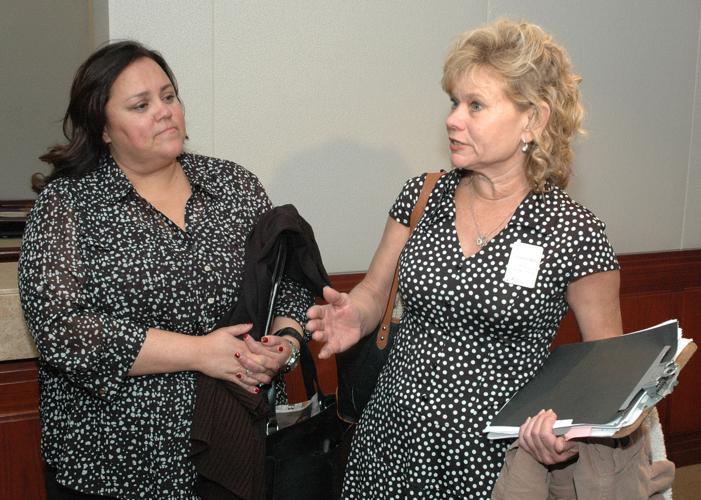Gov. Doug Ducey surprised some people with his emphasis on funding education and solving social problems in his State of the State speech.
But then, of course, his budget didn’t live up to the expectations he’d raised. His ballyhooed teacher-pay raises, for example, amounted to just 0.4 percent per year for five years — equal parts discouraging and encouraging for those deciding whether to stay in the profession.
“He got the goals right,” Dana Wolfe Naimark, president and CEO of Children’s Action Alliance, told me when she was in town last week. “It’s a much bigger shift in rhetoric than it is in substance.”
There is something simple, though, that Ducey could support that makes common sense, would raise revenue for education, is supported by some Republicans and wouldn’t raise taxes. Unfortunately for him, the issue pits his ideology against the pragmatic policy he laid out in his State of the State. And so far it looks like ideology will win.
The corporate low-income private-school tax credit is one of four credits the state offers. The way all the credits work is similar in that people or companies donate to so-called School Tuition Organizations, then get the amount donated back as a credit on their state income tax bill. The tuition organizations provide the donated money as scholarships to qualifying students.
The credits have been a lifesaver to some private schools, especially since the recession hit in 2008. John O’Hair, headmaster of Desert Christian Schools in the Tucson area, told me enrollment dropped 40 percent because of the recession, but it has built most of the way back up thanks in part to the credits. About 70 percent of the schools’ students get a scholarship through those programs, he said.
“We would lose between 40 and 50 percent of our population if the tax credit weren’t here,” he said.
But there’s something unusual about the corporate low-income credit, something that O’Hair recognizes, as do critics of the program. All of the credits are capped — either as a maximum amount an individual can take on their tax returns, or as an aggregate maximum amount that corporations can take. But the corporate low-income program’s cap increases by 20 percent each year, whereas the individual credits increase only at the rate of inflation.
The cap this fiscal year was about $62 million. Next year it will be more than $74 million, and by 2020 the cap will be higher than $100 million. That’s on top of the $79 million in tax credits that the other three programs accounted for in 2015. In other words, the corporate credit is increasingly becoming a budget monster that is sending to private schools money that could otherwise go to public schools.
Two Republicans, Rep. Doug Coleman and Sen. Kate Brophy McGee, have introduced a bill, HB 2080, that would curtail that growth. Instead of growing by 20 percent, year over year, the aggregate credits available to corporations would grow by 2 percent or the inflation rate, whichever is higher. That would slow the increase in the flow of tax dollars into private schools, but not reduce it.
The bill would make two other sensible changes to the corporate low-income tax credit. Now, these scholarships are available to any family making up to 85 percent more than the income required to qualify for a free school lunch -- about $83,000 for a family of four. The bill would change the amount to 33 percent higher than that income level. In other words, the families that benefit would really be low-income.
The bill also would put stricter limits on how much money the school tuition organizations can take for administrative fees. Now, those organizations can take 10 percent — a phenomenal proportion — but this bill would lower that to 5 percent.
The changes make common sense, but the bill will have to overcome big obstacles if it’s to become law.
One is the new Senate president. Sen. Steve Yarbrough has long championed school tax credits — in fact, he makes his living off of them. Yarbrough runs the Arizona Christian School Tuition Organization and in 2014 made $98,042 in salary plus $27,840 in other compensation doing this job, according to the group’s 990 tax form for the most recent year available.
You can expect Yarbrough to have no interest in slowing the flow of diverted tax money into his own accounts.
Disappointingly, Ducey told Howard Fischer of Capitol Media Services that he’s not interested in slowing down the increase in the corporate tax credit.
“Parental choice is important in a state like ours,” Ducey said.
True, of course, in the sweeping sense of the sentiment, but slowing down the growth in this credit does not stop parental choice. And it would keep in public coffers at least $12 million next fiscal year — and more the years after that —that would otherwise be diverted to private school tuition. In other words, as two Arizona teachers of the year pointed out Monday, it would be available to the very teachers and students whom Ducey says he wants to help.
But, of course, his ideology stands in the way of making the pragmatic choice that would help him accomplish the goals he laid out in his laudable State of the State speech.







